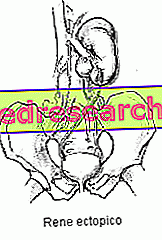Definition of ectopia
"Ectopia" is a term taken from medical language, which expresses the location of an organ or tissue in a wrong location. The etymological analysis of the term further clarifies the concept: the word ectopia derives from the Greek ἔκτοπος ( éktopos ): the root ek - means "outside", while the ending - tòpos "place". The literal "out of place" indicates a congenital anomaly due to a malformation originating during the development of the embryo; only rarely does ectopia manifest in the adult subject.
Classification
Ectopopia can affect many organs and tissues; in this regard, the ectopic manifestations have been classified according to the location affected:
- Renal ectopia
- Testicular Ectopia
- Ectopia lentis
- Ectopia cordis
- Ventricular ectopia
- Splenic Ectopia
- Thyroid Ectopia
By "ectopic pregnancy" (to which an entire in-depth article will be dedicated) is meant that pathology in which the embryo implantation takes place in extra uterine sites.
Many authors designate, with the term ectopia, also the wrong location of some genes: in other words, the expression of a gene in a place that is not its own, therefore different from the physiological one, is indicated as an ectopic expression of a gene, which in turn it generates ectopic organs or tissues.
Renal ectopia

Renal ectopia can develop into a "crusade" when the two kidneys merge, creating a single, abnormal bilobed kidney. In these cases there is often a considerable difficulty in passing urine from the affected patient. Fortunately, most of the time, the prognosis is good.
Simple renal ectopia affects one newborn every 1, 200, while the cross form is rare and affects one subject every 7, 000.
Testicular Ectopia
In the testicular ectopic form, the testicle is placed in an extrascrotal locus, usually near the femur (femoral ectopia), in the small pelvis (pelvic ectopia), in the groin or even at the root of the thigh. [taken from Manual of general surgery (2 vol.) of Fegiz / Marrano / Ruberti].
In testicular ectopias there is a veritable descent of the organ, whose mechanism is still unknown to many scholars.
Ectopia lentis
The ectopia lentis affects the lens of the eye, which is not located in the normal site: the crystalline lens, in ectopia lentis, can only be partially displaced, remaining inside the pupil, but it can also be totally dislocated, therefore more predisposed to cataract.
Lentis ectopia can be a consequence of trauma (acquired disease) or an inherited condition (in most cases). Furthermore, various forms of ectopia are distinguished:
- Ectopia lentis et pupillae: the pupil, remarkably small and little dilated, and the crystalline are positioned in opposite locations. It is a rare form transmitted genetically.
- Ectopia lentis familial: as the word itself predicts, this ectopia is transmitted from parents to children and the dislocation refers only to the crystalline lens.
[taken from clinical ophthalmology of Di Jack J. Kanski].
Ectopia cordis
Ectopopia cordis is an extremely rare genetic condition, which consists of the localization of the heart outside the subject's body: the heart emerges from the chest to dislocate at the level of the neck or in the abdominal cavity. Unfortunately, the prognosis is often poor; however, surgery, in some subjects, succeeds in restoring (literally) life to the newborn.
Cordis ectopia occurs at birth, generally in conjunction with other more or less serious diseases.
Thyroid Ectopia
In thyroid ectopia, a small draft of the thyroid gland is localized in an anomalous site (generally in the sublingual area): it is a rather rare congenital disorder that mainly affects the fairer sex (prevalence: 4 females / 1 male). Generally, thyroid ectopia remains silent for many years and most often remains a benign phenomenon.
However, even in sporadic cases, the sublingual thyroid remains the only thyroid sketch of the organism: in this regard, the thyroid tissue must not be excised surgically, except in cases where the thyroid ectopia causes pathological disorders serious. [from Otolaryngology by Ettore Alajmo]
Conclusions
Sometimes, the ectopic manifestations remain asymptomatic, since the affected subject does not perceive any disorder derived from the incorrect anatomical location. In other cases, however, ectopia is so severe that surgery is absolutely necessary for patient survival, just think of ectopia cordis.
Again, testicular ectopia requires surgery in most cases: it is necessary for the testicle to be returned to its original locus, in order to prevent not only the impairment of sperm activity, but above all the possible malignant tumor evolution.
However, ectopies must be treated surgically when they are associated with other disorders such as infections, chronic inflammation, circulatory diseases and malignant neoplasms.
To fix the concepts
Disorder | ectopia |
Description | The term ectopia expresses the location of an organ or tissue in a wrong location |
| Etymological study of the term ectopia | "Ectopia" comes from the Greek ἔκτοπος ( éktopos ): the root ek - means "outside", while the ending - tòpos "place" |
Classification of ectopies |
|
Renal ectopia | Simple renal ectopia: the kidney is dislocated in a wrong position, while remaining on the same side. Crucal renal ectopia: the only abnormal kidney generated by the fusion of both. |
Testicular Ectopia | The testicle is placed near the femur (femoral ectopia), in the small pelvis (pelvic ectopia), in the groin or at the thigh root. |
Ectopia lentis | The ectopia lentis affects the lens of the eye, which is not located in the normal site:
|
Ectopia cordis | The heart comes out of the chest to dislocate at the level of the neck or in the abdominal cavity |
Thyroid Ectopia | A small draft of thyroid is located in an anomalous site: generally, in the sublingual area |
| Therapies for the healing of ectopia | In many cases ectopia is asymptomatic and does not require surgery In other cases, ectopia is so severe that it compromises patient survival (eg ectopia cordis). |



